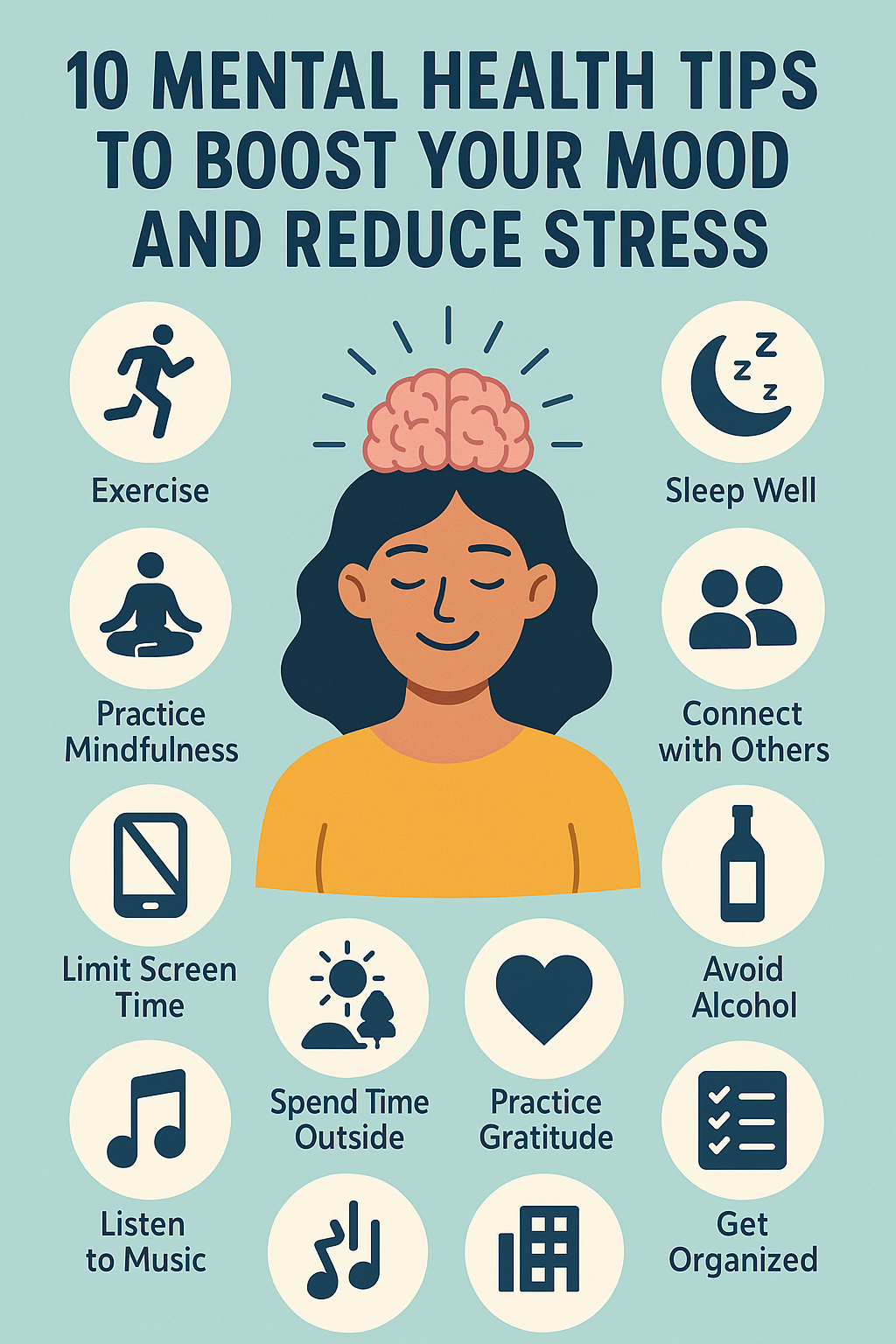
10 Mental Health Tips to Boost Your Mood and Reduce Stress
Discover practical mental health tips, fitness routines, and self-care strategies that will help you feel better and tackle stress head-on.
Introduction: Prioritize Your Mental Health
In today’s fast-paced world, stress is inevitable, but what’s not inevitable is how you deal with it. Mental health is just as important as physical health, and taking the time to nurture your mind can lead to a happier, healthier life. Let’s explore 10 mental health tips that will not only help boost your mood but also reduce stress.
1. Embrace Fitness Routines for a Happier Mind
Exercise is a game-changer when it comes to mental health. Regular physical activity releases endorphins, the body’s natural mood boosters. Whether it’s a quick 10-minute jog or a full workout session, incorporating fitness routines into your day can significantly lower stress levels and improve your overall mood.
2. Healthy Eating Plans for a Healthier Mind
Your brain is like a car engine – it needs the right fuel to perform at its best. A balanced, nutritious diet can work wonders for your mental health. Foods rich in Omega-3 fatty acids, antioxidants, and vitamins can help reduce anxiety and depression. So, let’s ditch the junk and embrace healthy eating plans for a brighter mood!
3. Practice Simple Meditation Practices
When life gets hectic, meditation can be your mental reset button. Even just five minutes of deep breathing or mindfulness can help you feel more centered. Simple meditation practices like focusing on your breath or using a guided app can help clear your mind and reduce stress.
4. The Role of Sleep in Mental Health
Ever felt like a zombie after a poor night’s sleep? Well, that’s because sleep and mental health are deeply interconnected. When you’re well-rested, you’re more resilient to stress and better equipped to handle challenges. Aim for 7-9 hours of quality sleep every night to improve your mood and productivity.
5. Affordable Fitness Equipment for Home Workouts
You don’t need an expensive gym membership or fancy equipment to stay fit. Affordable fitness equipment like dumbbells, resistance bands, or a yoga mat can provide effective workouts from the comfort of your own home. Plus, home workouts are a great way to fit in fitness routines when you're short on time.
6. Self-Care Strategies for Reducing Stress
Self-care isn’t just about bubble baths and spa days (though those are great!). It’s about taking the time to listen to your body and mind. From journaling your thoughts to taking regular breaks during the workday, implementing self-care strategies can significantly reduce stress and help you stay mentally balanced.
7. Beginner’s Guide to Yoga: A Stress-Free Approach
Yoga is a fantastic way to combine movement with mindfulness. Even if you’re a beginner, yoga can be tailored to your skill level. Through gentle stretches, breathing exercises, and focused movements, you can release tension, reduce anxiety, and cultivate a sense of calm.
8. Top Diet Trends for Weight Loss in 2025
In 2025, we’re seeing a shift towards diets that focus on mental clarity and mood-boosting foods. From plant-based diets to intermittent fasting, these trends aren’t just about weight loss – they’re about creating sustainable, balanced eating plans that promote mental wellness.
9. How to Create a Personalized Fitness Plan
There’s no one-size-fits-all fitness plan, and that’s why creating a personalized fitness routine is key to sticking with it. Start by assessing your fitness goals, physical limitations, and preferences. Whether it’s strength training, cardio, or flexibility exercises, tailoring your plan to fit your needs will make it easier to stay consistent.
10. Best Mindfulness Practices for Reducing Stress
Mindfulness isn’t just about meditation; it’s about being present in the moment. Practices like mindful eating, taking deep breaths when stressed, or simply observing your thoughts can help you stay grounded. Incorporating mindfulness into your daily routine is one of the simplest yet most powerful mental health tips for stress reduction.
Conclusion: Take Charge of Your Mental Health
Your mental health deserves as much attention as your physical health. By embracing fitness routines, healthy eating plans, self-care strategies, and mindfulness practices, you can create a balanced lifestyle that reduces stress and enhances your mood. Remember, it’s all about small steps that lead to big changes. Prioritize your well-being, and you’ll be on your way to a happier, healthier you!
FAQs
1. How often should I exercise to improve my mental health?
Even a small amount of exercise, like 20 minutes a few times a week, can significantly improve your mood and reduce stress. The key is consistency!
2. Can a poor diet really affect my mental health?
Yes! Poor nutrition can impact your brain function, leading to mood swings, anxiety, and other mental health issues. A balanced, nutritious diet helps support mental clarity and emotional stability.
3. How can I start practicing yoga as a beginner?
Start with simple poses and focus on your breath. You don’t need to be flexible to begin – yoga is all about building strength, flexibility, and mindfulness over time.
4. What role does sleep play in managing stress?
Sleep is crucial for stress management. When you’re well-rested, your body can better handle stress, process emotions, and improve your overall mood. Aim for quality sleep to boost your mental well-being.
5. What’s an affordable way to get into fitness?
You don’t need a fancy gym! Affordable fitness routines can include bodyweight exercises, walking, or investing in basic equipment like resistance bands or dumbbells.